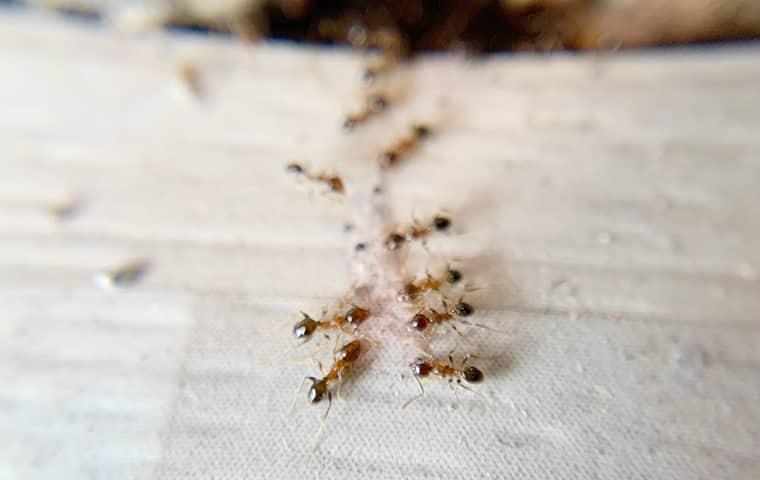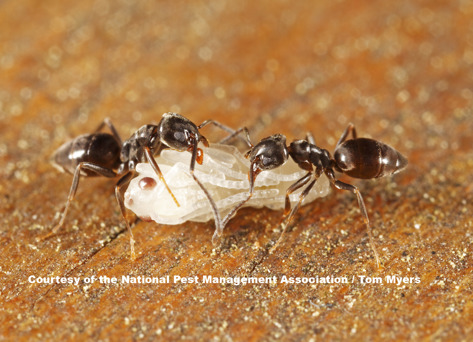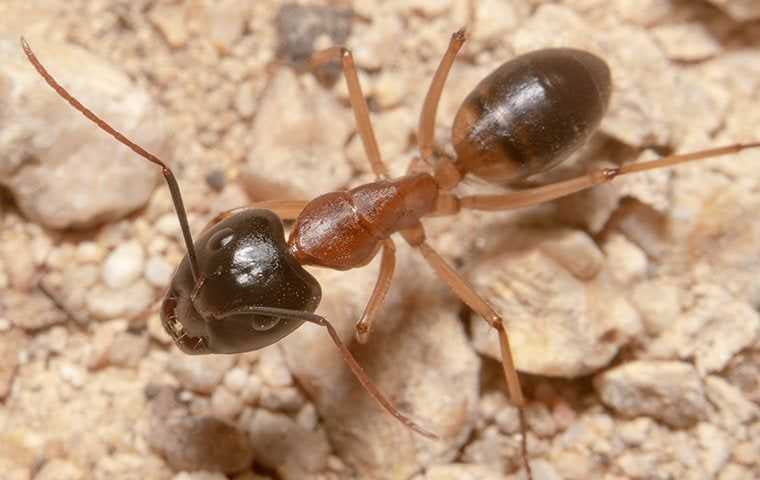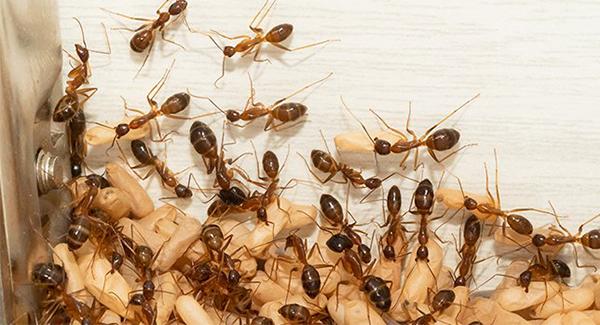To prevent ants, keep food sealed and store it properly to avoid attracting them into your home. Regularly clean up crumbs and spills to maintain a clean environment that is less appealing to ants.
Ants can be a nuisance in any household, causing frustration and potential damage. By implementing effective prevention strategies, you can keep these unwanted visitors at bay. In this guide, we will explore practical tips and techniques to help you deter ants from entering your living spaces.
From simple household habits to natural remedies, there are various methods you can employ to protect your home from ant infestations. Stay tuned to discover how you can create an ant-free environment and enjoy a pest-free living space.

Credit: www.parkwaypestservices.com
Identifying Common Entry Points
Preventing ants from entering your home starts with identifying the common entry points they use to infiltrate your living space. By understanding where these tiny invaders gain access, you can take proactive measures to seal them off and protect your home. There are three main areas you should focus on when inspecting for potential ant entry points:
Cracks And Gaps
Cracks and gaps in the foundation, walls, and other structural elements of your home are prime entry points for ants. These tiny creatures have the remarkable ability to squeeze through even the tiniest openings. Therefore, it’s essential to conduct a thorough inspection of your property to locate and seal any cracks or gaps that could serve as ant weak points.
Here are a few tips to help you identify and address cracks and gaps:
- Check the exterior of your home for visible cracks. Pay particular attention to the foundation, as cracks here can easily go unnoticed.
- Inspect all windowsills, door frames, and baseboards for gaps or openings.
- Use a flashlight to examine the interior and exterior walls for any signs of cracks or crevices.
- Seal cracks and gaps using a high-quality caulk or sealant appropriate for the specific material you are working with.
Doors And Windows
Doors and windows are commonly exploited by ants as entry points. These access areas are especially vulnerable if the weather stripping or seals are worn or damaged. Fortunately, you can take steps to reinforce the security of these entry points and discourage ant infestations.
Consider implementing the following measures:
- Inspect all doors and windows for any gaps or cracks in the frames.
- Ensure weather stripping is in good condition and provides a seal that ants cannot penetrate.
- Apply insect repellent on the exterior frames of doors and windows to create a barrier against ants.
- Repair or replace damaged screens to prevent ants from sneaking through them.
Utility Penetrations
Utility penetrations are another common entry point for ants. These include areas where pipes, cables, wires, and other utilities enter your home. Ants can easily exploit small openings around these entry points and find their way inside. It’s crucial to secure these areas to prevent ant infestations.
Consider the following tips when dealing with utility penetrations:
- Inspect all utility penetrations, including those in the kitchen, bathroom, and laundry areas.
- Seal any gaps or openings with caulk or sealant suitable for the material and utility in question.
- Use a wire mesh or steel wool to fill larger gaps around utility penetrations.
- Regularly check and maintain the areas around utility penetrations to ensure they remain secure.
By focusing on the common entry points mentioned above, you can fortify your home against ant invasions. Remember, prevention is the key to avoiding the frustration and inconvenience of dealing with an ant infestation inside your living space.

Credit: www.pestworld.org
Eliminating Food Sources
Eliminating food sources is essential in preventing ants from entering your home and creating infestations. By properly storing food and maintaining cleanliness, you can effectively deter these pesky pests and keep your space ant-free.
Proper Food Storage
Keep food items sealed in airtight containers to avoid attracting ants with easy access to their food source.
Regular Cleaning And Sanitation
Frequently wipe down countertops, sweep floors, and remove crumbs to eliminate any traces of food that may entice ants.
Removing Potential Nesting Sites
Outdoor Debris Removal
Regularly clear away leaves, twigs, and standing water from your yard to deter ants.
Yard Maintenance
Keep bushes trimmed, grass short, and mulch thin to reduce hiding spots for pests.
Sealing And Protecting Your Home
Keeping your home safe and secure from pesky ants is essential for maintaining a clean and pristine living environment. One of the most effective ways to prevent ants from invading your space is by sealing and protecting your home. By taking proactive measures and addressing potential entry points, you can create a barrier that ants will struggle to penetrate. This article will delve into the main strategies you can implement to safeguard your home against ant infestation.
Sealing Cracks And Crevices
The first step in fortifying your home against ants is to identify and seal any cracks and crevices they could use as entry points. Ants are incredibly resourceful when it comes to finding ways into our homes, squeezing through even the tiniest openings. Inspect the foundation, walls, and windows for any visible gaps or cracks. Once identified, apply caulk or weather-stripping to seal off these areas. This simple yet effective method will deny ants access to your living space, reducing the likelihood of an infestation.
Installing Door Sweeps
Doors are often an overlooked entry point for ants. These tiny insects can easily infiltrate our homes through gaps beneath doors, especially if they are not properly sealed. Installing door sweeps is an efficient and cost-effective solution to prevent ants from slipping under the doors. Door sweeps are typically made of metal or rubber and attach to the bottom of the door, eliminating any potential spaces where ants can enter. By securing your doors with sweeps, you can significantly reduce the chances of ants invading your home.
Sealing and protecting your home from ants is a critical step in maintaining a pest-free environment. By implementing strategies such as sealing cracks and crevices and installing door sweeps, you create a formidable defense against ant invasions. These preventive measures not only help safeguard your home but also promote a sense of cleanliness and well-being within your living space. Stay proactive and diligent in your ant prevention efforts to ensure your home remains ant-free.
Using Natural Repellents
Using natural repellents is an effective way to keep ants at bay without resorting to harsh chemicals. Not only are natural repellents safer for your family and pets, but they can also be just as effective. Here are some natural repellents that you can use to deter ants from invading your space.
Mint Oil
Mint oil is a potent ant deterrent that has a refreshing scent. Simply mix a few drops of mint oil with water and spray it around entry points and areas where ants are present. The strong aroma of mint will repel ants and discourage them from entering your home.
Citrus Peels
Citrus peels such as lemons, oranges, and grapefruits contain natural compounds that ants dislike. Place citrus peels near ant trails and entry points to create a natural barrier. You can also rub the peels along baseboards and window sills to prevent ants from crossing into your living spaces.

Credit: www.actionpest.com
Professional Pest Control Services
In the battle against ants, sometimes professional help is necessary to effectively eliminate an infestation. Whether it’s an ongoing problem or a severe outbreak, expert pest control services can provide the effective solutions needed to keep ants at bay.
Hiring Licensed Exterminators
Professional pest control services encompass the expertise of licensed exterminators. Their training and experience equip them with the capability to identify the root causes of ant infestations, allowing them to devise strategic plans for eradication. By hiring licensed exterminators, you can ensure that the techniques and products used are safe, effective, and compliant with industry standards. This professional approach gives you peace of mind and confidence in the lasting results.
Regular Inspections
One of the key aspects of professional pest control services is regular inspections to preemptively address any ant-related issues. By scheduling routine inspections, licensed exterminators can assess the susceptibility of your property to ant infestations and take proactive measures to prevent their occurrence. These periodic assessments enable the early detection of potential threats, ensuring that interventions are prompt and efficient.
Understanding Insect Behavior
When it comes to ant prevention, understanding their behavior is key. By gaining insights into their foraging patterns and nesting preferences, you can effectively protect your home from these unwanted invaders. Let’s delve into the fascinating world of ants and learn how their behavior can impact your ant prevention efforts.
Ant Foraging Patterns
Ants are diligent in their search for food, following specific foraging patterns to ensure their colony’s survival. By understanding these patterns, you can identify potential food sources and take measures to keep them inaccessible to ants.
Ants typically follow trails when foraging, leaving behind a scent that guides other ants to the food source. These trails can be easily disrupted using household cleaners or vinegar, which can erase the scent and discourage further ant activity. Keeping your countertops clean, regularly wiping up spills, and storing food in airtight containers can also help prevent ants from finding their way into your kitchen.
Nesting Preferences
Ants prefer to nest in warm, dark, and secluded areas. Knowing their nesting preferences can help you identify and eliminate potential ant infestation points in and around your home.
Common nesting sites for ants include cracks in walls and floors, gaps in windows and doors, and moisture-prone areas like bathrooms and kitchens. Regularly inspecting these areas for signs of ant activity, such as small piles of dirt or discarded wings, can help you identify nests before they become a major problem.
To deny ants suitable nesting sites, block off potential entry points by sealing cracks and gaps with caulk or weatherstrips. Ensuring proper ventilation and fixing any leaks or water sources can also help deter ants from nesting in moist areas.
In conclusion, understanding ant behavior is crucial for effective ant prevention. By being aware of their foraging patterns and nesting preferences, you can take proactive steps to make your home less appealing to ants.
Maintaining A Clean Environment
Discover essential ant prevention tips for maintaining a clean environment. Implement sealing cracks, eliminating food sources, and regular cleaning practices. Embrace these simple strategies to keep pesky ants at bay and create a hygienic living space.
Maintaining a Clean Environment is crucial in keeping ants at bay. Regular garbage disposal helps eliminate food sources that attract ants. Minimizing moisture reduces the chances of ants seeking water inside your home.Regular Garbage Disposal
– A clean environment discourages ants from invading your space. – Dispose of garbage promptly to avoid attracting ants to leftover food. – Seal trash bags tightly and empty them regularly to prevent food odors.Minimizing Moisture
– Fix leaky pipes and faucets to prevent excess moisture buildup. – Wipe down wet surfaces in the kitchen and bathroom daily. – Ensure proper ventilation in areas prone to dampness to deter ants.By adhering to these practices, you can create an environment that is less appealing to ants, ultimately helping to prevent infestations.Frequently Asked Questions For Ant Prevention Tips
How Do I Prevent Ants From Entering My Home?
To prevent ants from entering your home, make sure to keep your kitchen clean, store food in airtight containers, seal cracks and crevices, and use natural repellents like citrus peels or vinegar.
What Are Some Natural Ways To Repel Ants?
Natural ways to repel ants include using cinnamon, peppermint oil, lemon juice, and coffee grounds. These natural ingredients can be placed in areas where ants frequent to deter them from entering your home.
Why Are Ants Attracted To My Kitchen?
Ants are attracted to kitchens because of food and water sources. They are particularly drawn to sweet, sugary, and greasy substances. Keeping your kitchen clean and free of crumbs and spills can help reduce their attraction to the area.
Conclusion
Keep your home ant-free with these easy prevention tips. By maintaining cleanliness, sealing entry points, removing food sources, using natural deterrents, and seeking professional help when needed, you can effectively and safely keep ants away. Remember, prevention is key to avoid infestations.
Implement these strategies and enjoy a pest-free environment in your home. Stay proactive and say goodbye to those pesky ants!
Related posts:

I’m MD Tanvir, and I bring years of expertise gained from working closely with pest control companies to the forefront. My journey in the industry has inspired me to launch Bug Battler, a platform aimed at equipping people with the know-how to combat pests autonomously. Through Bug Battler, I aim to empower individuals with practical insights to tackle pest infestations effectively.

